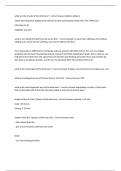QRM MULTIPLE CHOICE QUESTIONS WITH
ANSWERS
–
CHAPTER BY CHAPTER
Chapter 1 - Qualitative Research in Organizations
1. What is the primary focus of qualitative research methods?
A. Statistical trends
B. Numbers and averages
C. Understanding people and their behaviors
D. Measuring physical phenomena
Answer: C. Understanding people and their behaviors
2. What type of data does qualitative research primarily use?
A. Empirical data in text form
B. Numerical data
C. Visual data exclusively
D. Predefined datasets
Answer: A. Empirical data in text form
3. Which method is not a common data collection method in qualitative research?
A. Interviews
B. Surveys
C. Observation reports
D. Document analysis
Answer: B. Surveys
4. Which statement best differentiates qualitative research from quantitative research?
A. Qualitative research uses many participants but in less depth.
B. Quantitative research focuses on meanings and thematic patterns.
C. Qualitative research focuses on words and experiences.
D. Quantitative research is slower to analyze.
Answer: C. Qualitative research focuses on words and experiences
5. What are research paradigms in qualitative research?
A. Statistical models used for analysis
B. Techniques for numerical data collection
C. Predefined research methods
D. Perspectives shared by researchers about the subject and methods
Answer: D. Perspectives shared by researchers about the subject and methods
,6. What does ontology in research focus on?
A. Data collection methods
B. Beliefs about the nature of reality
C. Statistical analysis techniques
D. Writing research reports
Answer: B. Beliefs about the nature of reality
7. Which paradigm assumes reality is objective and independent of the researcher?
A. Positivism
B. Interpretivism
C. Critical realism
D. Empiricism
Answer: A. Positivism
8. What is the role of epistemology in research?
A. To understand how knowledge is acquired
B. To validate statistical findings
C. To collect numerical data
D. To observe physical phenomena
Answer: A. To understand how knowledge is acquired
9. Which paradigm emphasizes understanding reality through meanings people give to it?
A. Positivism
B. Interpretivism
C. Critical realism
D. Constructivism
Answer: B Interpretivism
10. What type of research is critical realism most associated with?
A. Experimental research
B. Mixed-method research
C. Explanatory research
D. Subjective and objective research balance
Answer: D Subjective and objective research balance
11. What does qualitative research prioritize over numerical data?
A. Statistical significance
B. Cultural trends
C. Words, experiences, and meanings
D. Predefined hypotheses
Answer: C Words, experiences, and meanings
, 12. Why is qualitative research often slower to analyze?
A. It uses fewer participants.
B. It focuses on in-depth thematic analysis.
C. It involves complex statistical techniques.
D. It requires predefined research frameworks.
Answer: B. It focuses on in-depth thematic analysis
13. Which paradigm most aligns with using theories to test cause-and-effect relationships?
A. Interpretivism
B. Positivism
C. Constructivism
D. Critical realism
Answer: B. Positivism
14. How does interpretivist research typically view objectivity?
A. Objectivity is impossible; reality is subjective.
B. Objectivity is paramount.
C. Objectivity depends on the chosen methodology.
D. Objectivity can be partially achieved.
Answer: A. Objectivity is impossible; reality is subjective
15. What do qualitative research paradigms influence most directly?
A. Sampling methods
B. Research strategy and interpretation
C. Statistical data collection
D. Research duration
Answer: B. Research strategy and interpretation
16. What is the primary goal of qualitative empirical research?
A. To establish statistical correlations
B. To create numerical patterns
C. To collect quantitative data
D. To understand social phenomena
Answer: D. To understand social phenomena
17. Which type of research involves observing reality from an insider's perspective?
A. Positivist research
B. Critical realism
C. Interpretivist research
D. Deductive research
Answer: C. Interpretivist research
ANSWERS
–
CHAPTER BY CHAPTER
Chapter 1 - Qualitative Research in Organizations
1. What is the primary focus of qualitative research methods?
A. Statistical trends
B. Numbers and averages
C. Understanding people and their behaviors
D. Measuring physical phenomena
Answer: C. Understanding people and their behaviors
2. What type of data does qualitative research primarily use?
A. Empirical data in text form
B. Numerical data
C. Visual data exclusively
D. Predefined datasets
Answer: A. Empirical data in text form
3. Which method is not a common data collection method in qualitative research?
A. Interviews
B. Surveys
C. Observation reports
D. Document analysis
Answer: B. Surveys
4. Which statement best differentiates qualitative research from quantitative research?
A. Qualitative research uses many participants but in less depth.
B. Quantitative research focuses on meanings and thematic patterns.
C. Qualitative research focuses on words and experiences.
D. Quantitative research is slower to analyze.
Answer: C. Qualitative research focuses on words and experiences
5. What are research paradigms in qualitative research?
A. Statistical models used for analysis
B. Techniques for numerical data collection
C. Predefined research methods
D. Perspectives shared by researchers about the subject and methods
Answer: D. Perspectives shared by researchers about the subject and methods
,6. What does ontology in research focus on?
A. Data collection methods
B. Beliefs about the nature of reality
C. Statistical analysis techniques
D. Writing research reports
Answer: B. Beliefs about the nature of reality
7. Which paradigm assumes reality is objective and independent of the researcher?
A. Positivism
B. Interpretivism
C. Critical realism
D. Empiricism
Answer: A. Positivism
8. What is the role of epistemology in research?
A. To understand how knowledge is acquired
B. To validate statistical findings
C. To collect numerical data
D. To observe physical phenomena
Answer: A. To understand how knowledge is acquired
9. Which paradigm emphasizes understanding reality through meanings people give to it?
A. Positivism
B. Interpretivism
C. Critical realism
D. Constructivism
Answer: B Interpretivism
10. What type of research is critical realism most associated with?
A. Experimental research
B. Mixed-method research
C. Explanatory research
D. Subjective and objective research balance
Answer: D Subjective and objective research balance
11. What does qualitative research prioritize over numerical data?
A. Statistical significance
B. Cultural trends
C. Words, experiences, and meanings
D. Predefined hypotheses
Answer: C Words, experiences, and meanings
, 12. Why is qualitative research often slower to analyze?
A. It uses fewer participants.
B. It focuses on in-depth thematic analysis.
C. It involves complex statistical techniques.
D. It requires predefined research frameworks.
Answer: B. It focuses on in-depth thematic analysis
13. Which paradigm most aligns with using theories to test cause-and-effect relationships?
A. Interpretivism
B. Positivism
C. Constructivism
D. Critical realism
Answer: B. Positivism
14. How does interpretivist research typically view objectivity?
A. Objectivity is impossible; reality is subjective.
B. Objectivity is paramount.
C. Objectivity depends on the chosen methodology.
D. Objectivity can be partially achieved.
Answer: A. Objectivity is impossible; reality is subjective
15. What do qualitative research paradigms influence most directly?
A. Sampling methods
B. Research strategy and interpretation
C. Statistical data collection
D. Research duration
Answer: B. Research strategy and interpretation
16. What is the primary goal of qualitative empirical research?
A. To establish statistical correlations
B. To create numerical patterns
C. To collect quantitative data
D. To understand social phenomena
Answer: D. To understand social phenomena
17. Which type of research involves observing reality from an insider's perspective?
A. Positivist research
B. Critical realism
C. Interpretivist research
D. Deductive research
Answer: C. Interpretivist research



